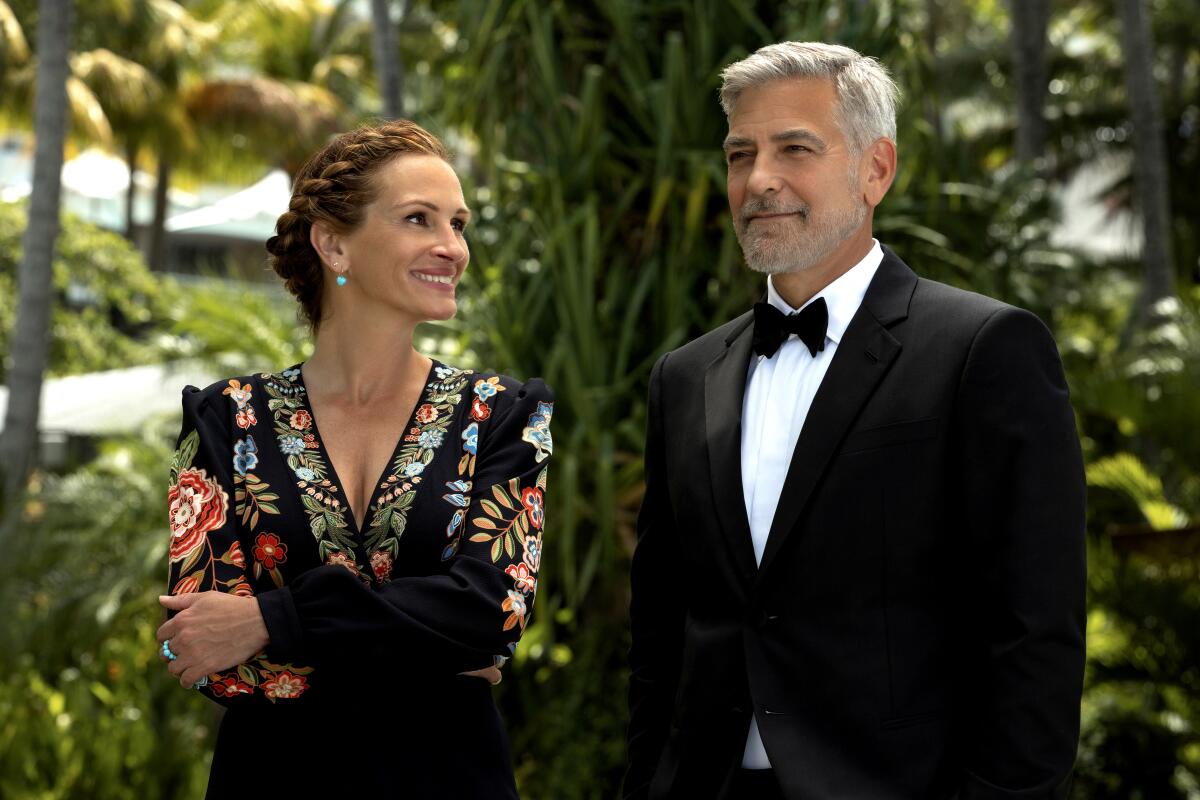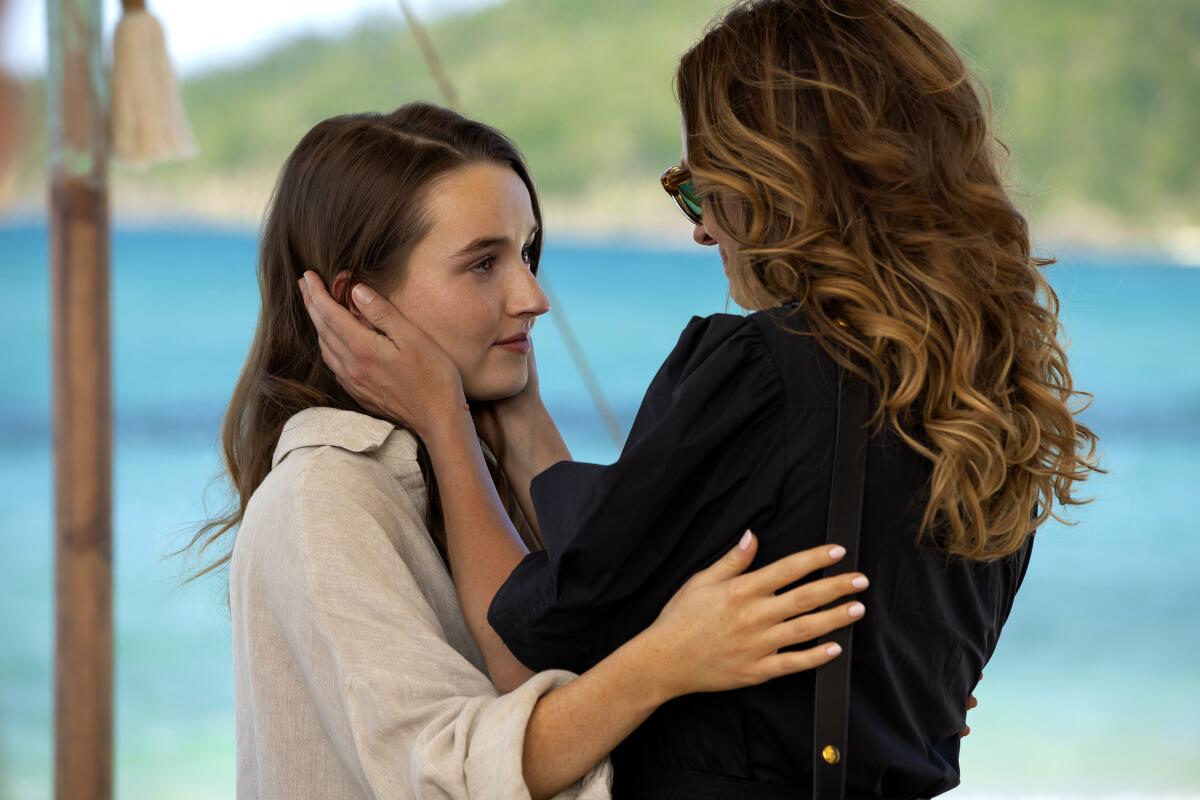What the ‘Ticket to Paradise’ box office opening says about the state of the rom-com

- Share via
If you want to breathe new life into the romantic comedy genre, it helps to breathe some old life into it.
At least that appears to be the lesson from the Julia Roberts-George Clooney “Ticket to Paradise,” which opened to $16.3 million at the domestic box office this weekend, propelled to a second-place finish behind the Dwayne Johnson superhero film “Black Adam” by the combined star power of seasoned rom-com vets. Despite widespread predictions of the impending extinction of the genre on the big screen, the stronger-than-expected result showed that, for romantic comedy fans, paradise may not be lost quite yet.
When the first trailers for “Ticket to Paradise” appeared this summer, you could be forgiven if you checked the calendar to see what year it was. Everything about the film — its picture-postcard South Pacific setting, its breezy banter, the very presence of the 54-year-old Roberts and 61-year-old Clooney as squabbling divorced parents brought together by the wedding of their daughter (Kaitlyn Dever) — felt like a throwback to an earlier era when such romantic baubles were a staple of moviegoing.
But even as today’s audiences find themselves inundated with rom-com options on the small screen, the nostalgic formula of “Ticket to Paradise” proved an irresistible draw, particularly to the sort of older moviegoers who have been drifting away from theaters.
Sixty-four percent of the opening-weekend audience was older than 35, and, while reviews were decidedly mixed, audiences gave the film an A-minus CinemaScore. Overseas, the film has grossed more than $80 million to date, making it the biggest rom-com to feature two over-50 leads since 2009’s “It’s Complicated.”
‘Ticket to Paradise’ doesn’t have any surprises, but who needs them when it can lean on the movie star wattage of Julia Roberts and George Clooney?
“‘Paradise’ is exactly what the domestic domestic box office needed,” said Jim Orr, president of domestic theatrical distribution for Universal Pictures, which released the film. “It’s a charming, engaging, heartwarming romantic comedy that managed to bring out adults in great numbers to see the incredible chemistry between Julia Roberts and George Clooney. Almost two-thirds of our audience was over 35, which is not the easiest demographic to get that kind of a number. You combine that with the really good audience reaction score and all of that points to a very long, successful run at the domestic box office.”
The film’s strong opening stands in marked contrast to the dismal $4.8-million start for Universal’s previous rom-com, “Bros,” which hit theaters less than a month ago. That film centered on two gay men, played by Billy Eichner and Luke Macfarlane.
In the wake of that disappointing opening, Eichner — who also co-wrote the film — suggested close-minded audiences were to blame. “That’s just the world we live in, unfortunately,” Eichner tweeted. “Even with glowing reviews, great Rotten Tomatoes scores, an A CinemaScore etc, straight people, especially in certain parts of the country, just didn’t show up for Bros.”
Orr dismissed comparisons between “Ticket to Paradise” and “Bros,” pointing out that the two films — one a breezy PG-13 confection, the other a more provocative and infinitely raunchier R-rated film — are wildly different. “I would not compare and contrast with ‘Bros,’ ” Orr said. “Those are apples and oranges.”
According to Paul Dergarabedian, senior media analyst at Comscore, the key factor in the two pictures’ varying fortunes may come down to movie star wattage.

“‘Bros’ had nothing close to this star power,” said Dergarabedian, pointing to spring’s Sandra Bullock-Channing Tatum romantic adventure “The Lost City” as another throwback film spurred to success by its A-list stars — with a $105-million gross in North America and $191 million globally. “There’s so much romantic comedy available on the small screen that, unless you have that star horsepower to get an audience’s attention, you’re going to have a tough time getting traction with a rom-com in the current marketplace.”
Indeed, Roberts and Clooney, who showed off their sparkling off-screen repartee throughout the months-long marketing campaign for “Ticket to Paradise,” have a deep well of goodwill to draw upon with audiences, both individually and as a pair.
While “Ticket to Paradise” marks their first rom-com together, their five onscreen collaborations — which also include “Ocean’s Eleven,” “Confessions of a Dangerous Mind,” “Ocean’s Twelve” and “Money Monster” — have collectively earned more than $1 billion at the global box office.
Still, between the glut of content readily available via streaming, the lingering effects of the COVID-19 pandemic on moviegoing and broader societal shifts in attitudes toward courtship and marriage, today’s multiplex remains far less hospitable to the once-reliable rom-com genre than it used to be.
Even with its healthy start, “Ticket to Paradise” still lags behind the rom-com blockbusters that Roberts and Clooney each regularly made in decades past. Roberts’ 1999 film “Runaway Bride,” for example, opened to $35 million — or more than $62 million in today’s inflation-adjusted dollars. The opening weekend haul for “Ticket to Paradise” does not even crack the top 50 domestic debuts for the romantic comedy genre, according to data compiled by Box Office Mojo. (It’s worth noting that the highest-grossing romantic comedy of all time remains 2002’s “My Big Fat Greek Wedding,” which grossed more than $368 million worldwide despite lacking any A-list stars.)
In one scene in “Ticket to Paradise,” one of the film’s younger characters comments snarkily on Clooney’s drunken dance-floor gyrations, calling them “dinosaur moves,” a knowing nod to the fact that the two-time People magazine “Sexiest Man Alive” — who, like Roberts, has shifted in recent years toward more mature and character-oriented projects — is now squarely in the AARP demographic.
But while “Ticket to Paradise” may itself be something of a dinosaur, its box office performance thus far suggests that the asteroid hasn’t entirely wiped out the big-screen romantic comedy yet.
“This movie is like a comfortable shoe,” Dergarabedian said. “It feels decidedly old-fashioned in a way, but that’s actually playing in the film’s favor. With all that’s going on in the world, going to see ‘Ticket to Paradise’ is a way for people to just have a fun, escapist experience in the movie theater, which is far different from watching this kind of movie at home. Let’s see where they are in a month domestically. But I think it will have long-term playability.”
More to Read
Only good movies
Get the Indie Focus newsletter, Mark Olsen's weekly guide to the world of cinema.
You may occasionally receive promotional content from the Los Angeles Times.









